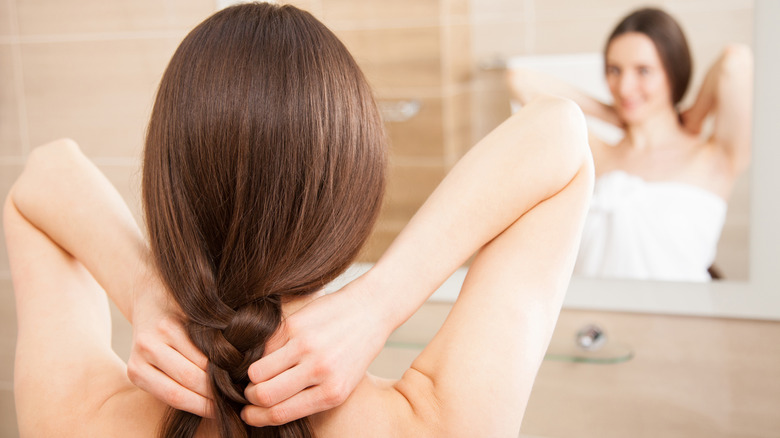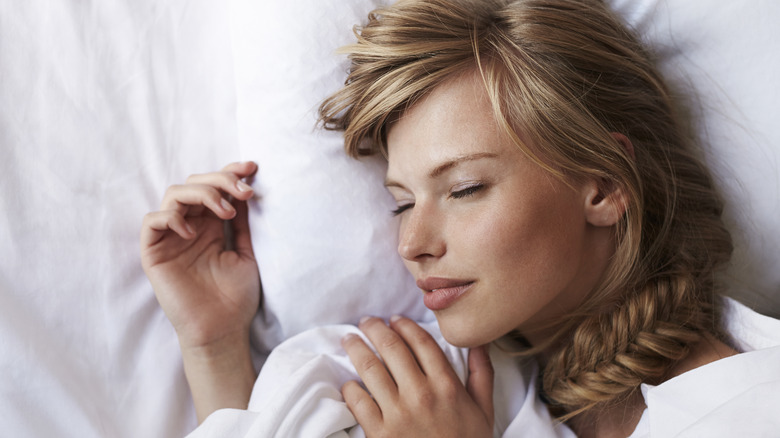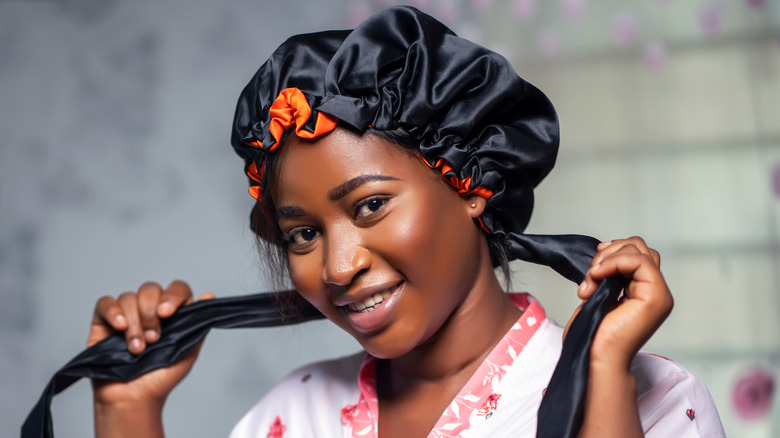Why Sleeping With Braided Hair Is The Better Alternative To A Bun Or Ponytail
Many of us focus on what we do with our hair during the daytime hours, as that is the time when it's most on display. Figuring out what hairstyle to wear and which products to use can often be a challenge. However, the secret to having gorgeous hair during the day often starts at night. How we care for our locks before bed can have a huge impact on the way our hair looks the following day.
To keep your strands looking their best, it's crucial not to go to sleep with wet hair. So if you shower at night, be sure to dry your hair before climbing into bed, as sleeping with wet hair can cause breakage and other damage to your mane. It's also key to detangle your hair before hitting the sheets. Running a brush through your hair will help distribute the oil in your strands and keep your hair moisturized. Using treatments like a serum or leave-in conditioner can also be beneficial for your hair while your sleep. In addition, protecting your hair with a silk pillowcase or bonnet will also combat damage while you toss and turn at night.
Of course, one of the most important things you can do to protect your hair at night is to sleep with the proper hairstyle.
Why braids are best for sleeping
When it comes to protecting your hair while sleeping, one important thing you should consider: How are you wearing your hair at night? Do you leave it free to fall across your face and get tangled? Do you pull it up into a tight bun or ponytail? If so, you may want to reconsider your sleeping hairstyle. Wearing your hair loose can cause it to get oily throughout the night. Meanwhile, wearing a tight hairstyle puts strain on your strands and could lead to breakage or thinning hair. For an easy hairstyle that will be gentle on your locks, a braid is recommended by many.
"[Braids] keep the hair from getting all over the place and are a good way to maintain your hair if you already have waves," hair salon owner Nunzio Saviano tells Byrdie. He also reveals that braids can benefit those with naturally tight curls because the style can help relax their curls and combat frizz. Wearing a braid at night minimizes friction between your hair and the pillow, meaning it's a great way to combat breakage. Braids also keep hair from getting tangled at night and can even aid in locking in moisture.
Wearing a braid can also give you beach waves — an easy hairstyle for the next day — while keeping your face clean. Of course, it's key to braid dry hair, and keep the style loose. Meanwhile, if your hair is too short or braids aren't for you, there are other options.
Alternatives to sleeping in a braid
If you can't or simply don't want to braid your hair at night, there are other ways to protect your locks from damage while you sleep. Placing your hair in a loose, low ponytail or a loose bun, held with either a soft hair tie or silk scrunchie, is not as secure as a braid; however, it can keep your hair out of your face and keep it from excessively rubbing against the pillow and sheets.
If your hair is too short to braid, you could consider twisting your strands instead. This will help reduce breakage, friction, and split ends. If you don't want to tie your hair up at all, using a silk cap or a bandana is likely your best bet. This will allow you to have your strands free, but also keep them away from your face and protect them from the pillow.
Protective nighttime hairstyles like braids can make all the difference in the health of your hair, and at times even allow you to set a hairstyle for the next day. Figuring out what works for you to protect your locks and get a good night's sleep may take some experimenting, but it will likely be worth it in the long run.


